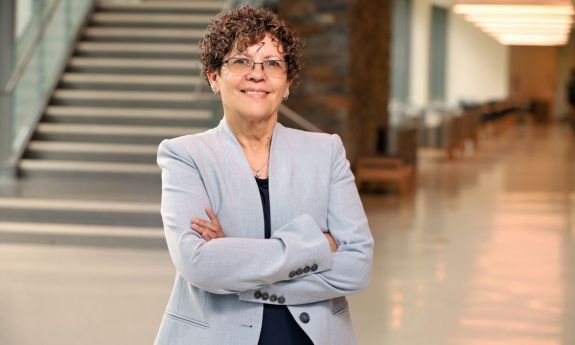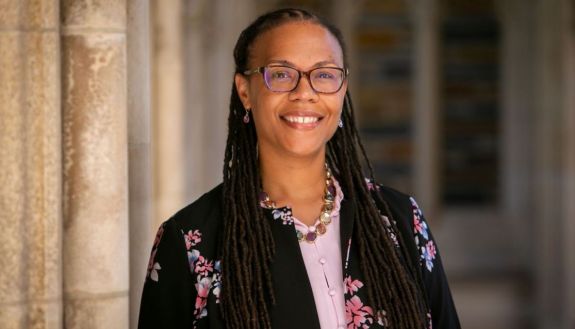Nursing Professor Iris Padilla Named Presidential Fellow

She will participate in meetings of the Board of Trustees, the Senior Leadership Group, the President’s Cabinet, the Deans Cabinet, and certain presidential and provostial committees. She also will have short rotations shadowing academic and administrative leaders in various units and schools across the campus.
“The university is almost like a puzzle, and nursing is one piece, but I hope this will let me see how we fit within the university and the health system and beyond.”
Iris Padilla
It will also allow her to create networks outside of the School of Nursing, “I want to get a more holistic view of the university structure and functions,” she said. “The university is almost like a puzzle, and nursing is one piece, but I hope this will let me see how we fit within the university and the health system and beyond.”
Past fellows‘ work
Padilla’s role won’t be just observational. Presidential Fellows have built a strong tradition of offering ideas and raising questions throughout their term. Padilla follows Tyson Brown (Trinity – sociology), Adrienne Stiff-Roberts (Pratt – materials science) and Deondra Rose (Sanford – public policy) as the fourth presidential fellow.
She thanked Price for the opportunity. “I’m very excited,” Padilla said about the fellowship. “I read through Adrienne’s article and some of the things she said about what she accomplished really hit home. She said that her experience showed her that if you want to make an impact at the university level and beyond your academic work you really need to know how things work. I totally agree!”
Price said Padilla will further strengthen the program.
“I look forward to working with Iris this year,” said Price. “Her background as a nursing professor and practicing clinician gives her a unique perspective on the university’s mission and operations, and I expect this fellowship will be an enriching experience both for Iris and for those of us who work with her.”
Currently a leader in the nursing school’s Faculty Governance Association, Padilla brings to the fellowship a record of university service and making connections across disciplines. Her scholarship includes studying collaborations between caregivers in different academic professions.
During the past year as a member of the nursing Faculty Governance Association, Padilla was tasked with rewriting the nursing faculty bylaws, and she found herself researching years of bylaws at the university level. The experience piqued her interest in understanding how nursing fits into the broader university environment and why rules are written as they are.
“I’m a person who likes to ask why: Why things are done the way they are and what makes them this way,” Padilla said. “I don't know why I need to know all the details, but I think it's the nursing clinician in me.”
As the first fellow from the nursing school, Padilla said she is proud to represent a voice from one of the university’s oldest but smallest schools. She also believes that her health system experience could offer valuable ideas for addressing university challenges.
“When you mention Duke, the first thing many people think of is the hospital,” she said. “Having somebody from the health system as a fellow is important because it gives you a whole different perspective on how we perceive some of the university issues.”
‘Drawing back the curtain’
She added that the program benefits the university by “drawing back the curtain on some of the unknowns involved in administrative decision-making.
“It’s helpful for the university to have faculty understanding these processes. Without a clear understanding of how decisions are made, faculty members may create their own narrative which can lead to misconceptions. Demystifying the process is healthy for an organization.”
Her clinical work focuses on diabetes and self-care management for disadvantaged population the Durham Community, but Padilla holds an M.B.A. degree in addition to her Ph.D. in nursing. She said she sought the M.B.A. in large part because she wanted to better understand decision-making on the business side of organizations such as hospitals and universities.
“I’ve had nurses tell me they don’t speak that business language, and I get that,” Padilla said. “When I started my M.B.A., I didn’t fully understand the business side at all, either. But I learned a lot about how decisions are made, and I believe this (fellowship) will help me communicate that process to others.”
As part of the year-long fellowship, in addition to her rotations through various administrative and academic units in the fall, next spring Padilla will organize a project designed to support a university priority, and hopes to build something that would benefit the wider university.
“I have some ideas that I’m tossing around. I want to take on a project that benefits not just the nursing school, but the university, contributing to the growth and development of students and faculty,” she said. “I’d like to see something that fosters collaboration across different schools and the health system.”
READ MORE


